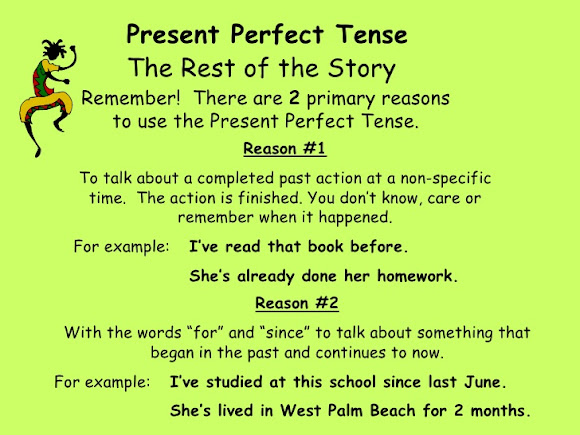What's the difference? Present Perfect Simple and Present Perfect Continuous We use both of these tenses for finished and unfinished actions. The present perfect simple can be used (often with 'since' and 'for') to talk about unfinished actions that started in the past and are still true in the present. It's often used with stative verbs: I' ve known John for three years. The present perfect continuous can also be used (often with 'since' and 'for') to talk about unfinished actions that started in the past and are still true in the present. (Of course, we don't use the present perfect continuous with STATIVE VERBS): She's been living here for three years. Sometimes there's really no difference in meaning between the two tenses. This is especially the case with verbs such as 'live', 'work' and 'study': They've lived in London since 2004. They've been living in London since 2004. I've studied ...
Entradas
Mostrando las entradas etiquetadas como Grammar
- Obtener enlace
- X
- Correo electrónico
- Otras aplicaciones
UNIT 7 TOPIC 1: SUBJECT QUESTIONS Subject questions are questions we ask when we want information about the subject of something. The subject of a sentence is the person or thing that performs the action. Who works in a bank? Mary . ¿ Quién trabaja en un banco? Mary. La estructura de las subject questions en inglés Las subject questions se utilizan para saber quién o qué realiza la acción, es decir, formulamos preguntas sobre el sujeto de una oración. Este tipo de preguntas siguen la estructura siguiente: Question word + verbo principal + (complementos) ? Tomaremos de referencia la misma frase anterior: En este caso solo podemos formular una subject question : Who bought this nice mug in Ireland? TOPIC 2: OBJECT QUESTIONS Most questions in English are object questions – we want to know about the receiver of the action. These questio...
- Obtener enlace
- X
- Correo electrónico
- Otras aplicaciones
WORKBOOK REVIEW LET'S TAKE OUR TEST READ CAREFULLY PAST SIMPLE VS PAST CONTINUOUS https://www.youtube.com/watch?v=kHNwVK_IB-0 Grammar explanation Grammar explanation The past continuous and the past simple help us to show howNtwo past actions or situations are connected. Past simple The past simple shows us that an action was in the past, not in the present. Regular past simple verbs have - ed at the end (e.g. called , played , arrived ). Irregular verbs have a different form, usually with a different vowel sound (e.g. wake → woke , break → broke , feel → felt ). My parents called me yesterday. I woke up early this morning. Sam played basketball when he was at university. We make the negative with didn't and the infinitive verb. My parents didn't call me yesterday. I didn't wake up early this morning. We make the question form with did and then the subject and infinitive ve...


